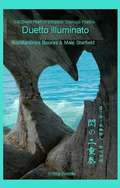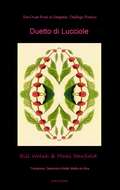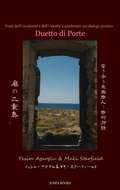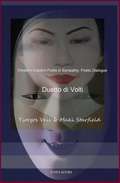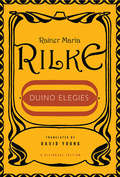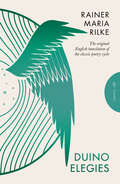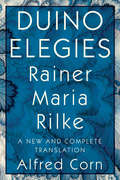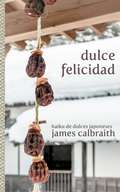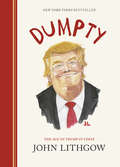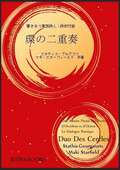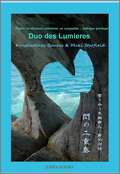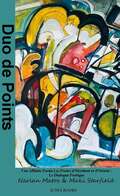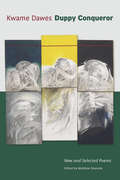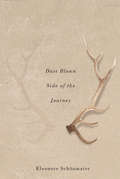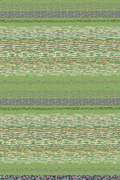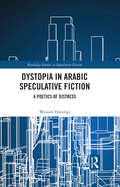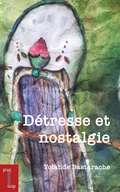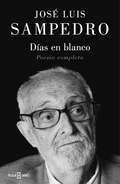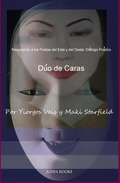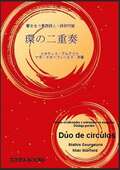- Table View
- List View
Duetto Illuminato
by Konstantinos Bouras e Maki StarfieldIl poeta greco Konstantinos Bouras e la poetessa giapponese Maki Starfield dialogano sulla "Illuminazione". Testi in giapponese, inglese e greco. L'illuminazione è un risveglio improvviso e permanente verso l'unità di tutti gli esseri viventi. In un certo senso siamo già illuminati, abbiamo già raggiunto questo stato. "L'illuminazione è semplicemente una fiducia basilare e profonda in te stesso e nella tua vita." Attraverso le loro liriche puoi chiedere a te stesso "Chi sono?", e allo stesso modo "Cos'è l'illuminazione?". La domanda è l'insegnamento, e anche il semplice porsela porta con se un atto di trasformazione.
Duetto di Lucciole
by Maki StarfieldDuetto di Lucciole È una raccolta di poesie di due poeti eccellenti che riempiranno le aspettative del lettore
Duetto di Porte: Poeti dell’Occidente e dell’Oriente a confronto: un dialogo poetico
by maki starfield/Yesim AgaogleLa poetessa turca Yesim Agaogle e la poetessa giapponese Maki Starfield presentano un bellissimo dialogo in “Duetto di porte”. Le illustrazioni e le foto sono di Yesim Agaogle e Bill Wolak.
Duetto di Volti
by Yiorgos Veis e Maki StarfieldRaccolta di poesie di Yiorgos Veis e Maki Starfield. Il poeta greco Yiorgos Veis e la poetessa giapponese Maki Starfield dialogano sui "volti". A volte le persone perdono il loro volto abituale a causa del disappunto, della tristezza, e anche la paura e l'ansia contribuiscono a gettare un'ombra sui volti. Le persone solitamente leggono i loro volti a vicenda, è un processo naturale. Si accostano a volti con cui stabiliscono un rapporto di confidenza e amore, e mentre sono intenti a farlo appaiono di fronte a i loro occhi nuovi volti... pensieri reconditi sulle persone, la bellezza del volto; sono tutti aspetti che riecheggiano tra le pagine della raccolta.
Duino Elegies (A Bilingual Edition)
by Rainer Maria Rilke David YoungOne of the literary masterpieces of the century, this translation is now presented with facing-page German. We have a marvelous, almost legendary, image of the circumstances in which the composition of this great poem began. Rilke was staying at a castle (Duino) on the sea near Trieste. One morning he walked out on the battlements and climbed down to where the rocks dropped sharply to the sea. From out of the wind, which was blowing with great force, Rilke seemed to hear a voice: Wer, wenn ich schriee, horte mich denn aus der Engel Ordnungen? (If I cried out, who would hear me up there, among the angelic orders?). He wrote these words, the opening of the first Duino Elegy, in his notebook, then went inside to continue what was to be his major work and one of the literary masterpieces of the century.
Duino Elegies, Deluxe Edition: The original English translation of Rilke's landmark poetry cycle, by Vita and E dward Sackville-West - reissued for the first time in 90 years
by Rainer Maria RilkeThe first-ever English translation of Rilke&’s landmark poetry cycle, by Vita and Edward Sackville-West – reissued for the first time in 90 yearsIn 1931, Virginia and Leonard Woolf&’s Hogarth Press published a small run of a beautiful edition of Rainer Maria Rilke&’s Duino Elegies, in English translation by the writers Vita and Edward Sackville-West. This marked the English debut of Rilke&’s masterpiece, which would eventually be rendered in English over 20 times, influencing countless poets, musicians and artists across the English-speaking world. Published for the first time in 90 years, the Sackville-Wests&’ translation is both a fascinating historical document and a magnificent blank-verse rendering of Rilke&’s poetry cycle. Featuring a new introduction from critic Lesley Chamberlain, this reissue casts one of European literature&’s great masterpieces in fresh light.
Duino Elegies: A New And Complete Translation
by Rainer Maria RilkeA new translation of Rilke’s classic elegies—ten mystical, radiant poems that bring together the beautiful and the sacred. Rainer Maria Rilke’s Duino Elegies are one of the great literary masterpieces of the twentieth century. Begun in 1912 while the poet was a guest at Duino Castle on the Adriatic Sea and completed in a final bout of feverish inspiration in 1922, the ten elegies survey the mysteries of consciousness, whether human or animal, earthly or divine. Poet and translator Alfred Corn brings us closer to Rilke’s meaning than ever before and illuminates the elegies’ celebration of life and love. Also included are a critical introduction exploring the nuances of the translation, several thematically linked lyrics, and two of the “Letters to a Young Poet” to complete the volume.
Dulce Felicidad
by James Calbraith Bárbara Villarreal GonzálezYa sea como un ingrediente crucial de la ceremonia del té, un elemento importante de los rituales del santuario o simplemente como una manera de refrescarse a sí mismo del sofocante calor japonés, los dulces son tan esenciales para la cultura y la vida japonesa como la poesía y la jardinería. Para mi también han sido una manera de experimentar esta cultura y los mejores recuerdos de Japón están de alguna u otra manera conectados con sus innumerables bocadillos. Una noche de verano comencé a escribir haiku acerca de estos recuerdos y como resultado se produjo este pequeño libro. Dulces y poesía ¿Qué más necesita un hombre sabio? En esta noche de verano 70 haiku y senryu acerca de dulces japoneses con breves comentarios para cada poema acerca de la historia y el origen de cada bocadillo.
Dumpty: The Age of Trump in Verse (Dumpty Ser. #1)
by John LithgowNew York Times Bestseller!Dumpty: The Age of Trump in Verse is Volume 1 of a satirical poetry collection from award-winning actor and bestselling author John Lithgow. Chronicling the last few raucous years in American politics, Lithgow takes readers verse by verse through the history of Donald Trump's presidency.• Lampoons the likes of Betsy DeVos, William Barr, Rudy Giuliani, and dozens more.• Illustrated from cover to cover with Lithgow's never-before-seen line drawings.• Draws inspiration from A. A. Milne, Lewis Carroll, Edward Lear, and even Mother Goose.• Great for fans of A Very Stable Genius by Mike Luckovich, Win Bigly: Persuasion in a World Where Facts Don't Matter by Scott Adams, and The Donald J. Trump Presidential Twitter Library by The Daily Show with Trevor Noah.The poems collected in Dumpty draw inspiration from A. A. Milne, Lewis Carroll, Edward Lear, Rodgers and Hammerstein, Mother Goose, and many more. A feat of laugh-out-loud lyrical storytelling, this timely volume is bound to bring joy to poetry lovers, political junkies, and Lithgow fans alike. Audio edition read by the author.
Duo Des Cercles
by Maki Starfield Stathis GourgourisLe poète grec Stathis Gourgouris et la poétesse Maki Starfield pour un échange vivant sur les "cercles". Stathis Gourgouris démontre que "L'amour ne connaît pas la mort", tandis que Maki Starfield affiche le "cercle d'aspiration". "Duo Des Cercles" est une publication trilingue.
Duo d'Illumination
by Maki Starfield Konstantinos BourasLe poète grec Konstantinos Bouras et la poétesse japonaise Maki Starfield ont eu un dialogue sur « l'Illumination » écrit en japonais, anglais et grec. L’Illumination est un éveil soudain et permanent à l’unité absolue de tous les êtresDans un sens où nous sommes déjà illuminés ; nous y sommes déjà. « L’illumination n’est vraiment qu’une confiance profonde et fondamentale en vous-même et en votre vie » À travers leurs poèmes, vous pouvez vous demander: « Qui suis-je? » pour toujours, et il en va de même pour « Qu’est-ce que l’illumination? » La question est l’enseignement, et le simple fait de le poser peut entraîner une transformation.
Duo de Points: Une Affinité Parmi Les Poètes d’Occident et d’Orient : Le Dialogue Poétique
by Maki Starfield« Duo de Points » est le premier recueil de poèmes de Narlan Matos - le nouveau poète le plus important de l’Amérique latine de nos jours - et de la poétesse japonaise Maki Starfield. L’une des plus grandes vertus de sa poésie est sa capacité d’écouter et d’identifier les problèmes les plus profonds de notre temps, dans l’art et la critique sociale La vigueur, la générosité et l’intelligence de sa poésie lui confèrent la catégorie de poète universel D’autre part, l’attrait des poèmes de Maki Starfield est dans la poursuite de la réalité de la condition humaine dans le monde de l’illumination à travers l’autoréflexion dans le style de poème à 3 lignes, basé sur le haïku. On peut dire que les mots des deux jeunes poètes prometteurs sont le produit de la résonance de leurs âmes en une seule mélodie comme un lieu où l’Orient et l’Occident se confondent.
Duppy Conqueror
by Matthew Shenoda Kwame Dawes"[Dawes] is highly original and intelligent, possessing poetic sensibility that is rooted and sound, unshakeable and unstopped, both in its vibrancy and direction. He writes poetry as it ought to be written."-World Literature Today"Dawes asserts himself as man and artist and finally, with grace achieved and grace said, sits down to begin life's tragic feast . . . a writer of major significance."-Brag Book"The notion of a reggae aesthetic-of the language moving to a different rhythm, under different kinds of pressure . . . underpins all Dawes' work as poet."-Stewart BrownBorn in Ghana, raised in Jamaica, and educated in Canada, Kwame Dawes is a dynamic and electrifying poet. In this generous collection, new poems appear with the best work from fifteen previous volumes. Deeply nuanced in exploring the human condition, Dawes' poems are filled with complex emotion and consistently remind us what it means to be a global citizen.From "The Lessons":Fingers can be trained to make shapesthat, pressed just right on the gleamingkeys, will make a sound that can staytears or cause them to flow for days.Anyone can learn to make some music,but not all have the heart to beatout the tunes that will turn us inside out. . . Kwame Dawes is the author of fifteen collections of poetry, two novels, four anthologies, and numerous essays and plays. In 2009 he won an Emmy Award for his interactive website, LiveHopeLove.com. Since 2011 he has taught at the University of Nebraska, and lives in Lincoln, Nebraska.
During
by James Richardson"For James Richardson, poetry is serious and speculative play for both intellect and imagination... [He] makes familiar scenes strange enough to provoke new and startling insights."--National Book Award Judges"James Richardson is . . . a poet who earned his reputation as a master of imagery and concision."--The Christian Science Monitor"[O]ne of America's most distinctive contemporary poets . . . a powerful and moving body of work that in its intimacy and philosophical naturalism is unique in contemporary American poetry."--Boston Review"James Richardson's poetry is . . . unusual, quirky, personal, and profound."--The Threepenny ReviewIn this seriously playful new collection, James Richardson enters into underused and forgotten places in our emotional spectrum to revive lost feelings. His breathtaking skill with aphorisms open portals of new perspective to refresh us with their humor and make the familiar reinvigorated with the blessedly strange.From "Big Scenes":And what was King Kong ever going to dowith Fay Wray, or Jessica Lange,but climb, climb, climb and get shot down?No wonder Gulliver's amiably chattingwith that six-inch woman in his palm.Desire's huge, there's really nowhere to put itin this small world that it will stay put:might as well just talk...James Richardson is the author of six books of poetry, including By the Numbers, which was a National Book Award finalist, and his poems appear regularly in The New Yorker. He is a professor of English and creative writing at Princeton University and lives in New Jersey.
Dusk Outside The Braille Press
by Paul HostovskyFrom the book: Dusk Outside the Braille Press The lights go on in all the windows but one. It's the one in the northeast corner of the narrow three-story building at 88 St. Stephen Street where the proofreading department misses another sunset. Some of the white canes lean against the wall like backslashes in the unpunctuated dark, and some lie folded underneath the chairs like bundles of long chalk, a red one in each, and the fingers are passing over the dots like wind over buildings, and the braille dictionary in seventy-two volumes is stacked practically to the ceiling like a cord of wood. It steams in the darker darkness of a corner and a book louse is journeying imperceptibly through the D's. A proofreader stops reading, opens her watch and closes it click, reaches under her chair for her cane and opens it chick-a-chick into a white line which she sweeps across an invisible line which she walks straight to the hulking dictionary to look up a word which needs hyphenating. Braille is dots in a cell, lots and lots of cells. Each cell is a three-story building at dusk, the lights on in certain windows and not others. Each book is a city where the blind look in through the windows with their fingers pressed to the panes. Outside it's beginning to snow and each snowflake is a different character in the Complete Works of Beauty which contains only one mistake that the proofreading department can find, and the faces pressed to the windows are saying beautiful. And the fingers checking the time are saying time. And the white canes are opening in a chorus of switchblades and beginning to cut their separate paths home.
Dust Blown Side of the Journey
by Eleonore SchönmaierAt times apocalyptic and other times passionate and intimate, Eleonore Schönmaier’s poems show the beauty of the lived and natural world in both wilderness and urban settings. A woman hides her love letters in beehives, a cherry tree in full blossom is transported horizontally on a bike, and three crows tap their beaks on a metal door. A grandmother gestures how birds once flew in blue skies, public smiles are outlawed, and a shot-down jet lands in a field of wildflowers. Men from warm countries wear big coats and are falsely suspected of hiding bombs, an Indigenous man is forced by police into the trunk of a car, and a stork lands in prison under charges of espionage. In Canada, the northern village of Paradise is under evacuation orders, and in Europe Desmond Tutu steps down from a podium into a crowd of photographers. Over a Belgian lunch Frederic Rzewski talks about his piano concerto A Dog’s Life, and a Dutch dinner is shared with a young refugee boy who laughs joyously. Reflecting a childhood in the northern Canadian boreal forest, combined with an adult life lived without borders, Eleonore Schönmaier’s vivid and sensual language invites the reader to fully join in and enjoy the journey.
Dust Blown Side of the Journey (Hugh MacLennan Poetry Series)
by Eleonore SchönmaierAt times apocalyptic and other times passionate and intimate, Eleonore Schönmaier’s poems show the beauty of the lived and natural world in both wilderness and urban settings. A woman hides her love letters in beehives, a cherry tree in full blossom is transported horizontally on a bike, and three crows tap their beaks on a metal door. A grandmother gestures how birds once flew in blue skies, public smiles are outlawed, and a shot-down jet lands in a field of wildflowers. Men from warm countries wear big coats and are falsely suspected of hiding bombs, an Indigenous man is forced by police into the trunk of a car, and a stork lands in prison under charges of espionage. In Canada, the northern village of Paradise is under evacuation orders, and in Europe Desmond Tutu steps down from a podium into a crowd of photographers. Over a Belgian lunch Frederic Rzewski talks about his piano concerto A Dog’s Life, and a Dutch dinner is shared with a young refugee boy who laughs joyously. Reflecting a childhood in the northern Canadian boreal forest, combined with an adult life lived without borders, Eleonore Schönmaier’s vivid and sensual language invites the reader to fully join in and enjoy the journey.
Dwandageet
by Ramdhari Singh DinkarWritten by Dinkar from the years 1932 to 1939 and finally published in 1939, this is one of the best poems written by the poet.
Dying Modern: A Meditation on Elegy
by Diana FussIn Dying Modern, one of our foremost literary critics inspires new ways to read, write, and talk about poetry. Diana Fuss does so by identifying three distinct but largely unrecognized voices within the well-studied genre of the elegy: the dying voice, the reviving voice, and the surviving voice. Through her deft readings of modern poetry, Fuss unveils the dramatic within the elegiac: the dying diva who relishes a great deathbed scene, the speaking corpse who fancies a good haunting, and the departing lover who delights in a dramatic exit. Focusing primarily on American and British poetry written during the past two centuries, Fuss maintains that poetry can still offer genuine ethical compensation, even for the deep wounds and shocking banalities of modern death. As dying, loss, and grief become ever more thoroughly obscured from public view, the dead start chattering away in verse. Through bold, original interpretations of little-known works, as well as canonical poems by writers such as Emily Dickinson, Randall Jarrell, Elizabeth Bishop, Richard Wright, and Sylvia Plath, Fuss explores modern poetry's fascination with pre- and postmortem speech, pondering the literary desire to make death speak in the face of its cultural silencing.
Dyondzo Xitlhangu xa vutomi: UBC Uncontracted
by Jj MhlongoXana matimba i yini? Matimba i vutivi, byi kumeka edyondzweni. Lowu hi wona mongo lowu buku leyi yi ringetaka ku wu andlala. Ku hlamusela leswaku matimba-xidzi ya ku herisa vusweti i dyondzo.
Dystopia in Arabic Speculative Fiction: A Poetics of Distress (Routledge Studies in Speculative Fiction)
by Wessam ElmeligiDystopia in Arabic Speculative Fiction: A Poetics of Distress unpacks the nuanced Arabic contribution to speculative fiction. Part of a larger project by Elmeligi to formulate a poetics of literary theory to read Arabic literature, this book examines Arabic dystopian fiction from the lens of social causes of psychological distress. The selected novels combine works by authors already established in studies by Western scholars and many that have not been translated before or have not received enough scholarly attention, yet. The novels represent an array of Arab countries, including Algerian, Egyptian, Jordanian, Kuwaiti, Mauritanian, Syrian, and Tunisian authors. It also highlights the contribution of women authors to Arabic speculative fiction. This book enriches the conversation about what is quite possibly a significant speculative fiction turn in the Arabic novel, as well as provides a new theoretical approach to read such complex and innovative literature.
Détresse et nostalgie (Essais et fiction)
by Yolande BastaracheIn Détresse et nostalgie, Yolande Bastarache paints a village, its families, its seasons, its times. From the sixteen short stories of this posthumous collection emerge of swathes of life that take on their full meaning and color, with the passing of time, the cycles of snowstorms and daisies, simple joys and strong emotions, days and decades. Yolande sketches the contours of the author's childhood home, moments of gentleness and distress, moments of daily life against a beckoning horizon.
Días en blanco: Poesía Completa
by José Luis SampedroUn escritor reconocido. Un poeta desconocido. Este es un libro fruto del desorden y superviviente de las mudanzas, como reconoce Olga Lucas en su introducción a este texto. Después de varios años de un laborioso y exhaustivo proceso de revisión de los documentos que José Luis Sampedro dejó tras su fallecimiento en 2013, aún quedaban algunas cajas por explorar, que albergaban uno de los secretos mejor guardados de su autor. Sabíamos que fue un novelista extraordinario, un prestigioso economista e intelectual, y ahora, gracias a este maravilloso hallazgo, descubriremos que también fue un magnífico poeta aunque muy pocos supieran de su vocación. La poesía llegó a su vida en un momento clave y supuso el despertar de su voz literaria, una pasión que no abandonó hasta el final de sus días y por la que sentía un enorme respeto. Movilizado en el frente -en ambos- pasó la Guerra Civil siempre acompañado de su diccionario y su libreta, la primera que acogió sus versos sencillos, elegantes y humanos, a la que seguirían otros cuadernos, folios escritos a mano o mecanografiados, corregidos sin cesar a lo largo de toda su vida y guardados en un sobre con la anotación Días en blanco. Este libro reúne cincuenta años de creación inédita y constituye una pieza esencial para entender el legado de su autor. Ahí reside la magia de este afortunado reencuentro con una faceta desconocida de nuestro querido José Luis Sampedro. «En su poesía está José Luis Sampedro. En estado puro. Con toda su complejidad. Con toda su humanidad. Con todo su compromiso, con su tiempo y consigo mismo. Con toda su genialidad.»José Manuel Lucía Megías *** Este será mi premio y mi victoria.Que una tarde, al leerme,necesites buscar entre las páginas,una rosa olvidada, que no existe.Y al no encontrarla, silenciosamente,te asomes angustiado a la ciudad,y veas, por vez primera,que elacero y los hombres son ceniza.Que la brisa es un río de palabras marchitas.Que siempre que se mira bien el mundose asiste al acabar de alguna cosa.Y que a pesar de todo,muy en el fondo, inexplicablemente,es hermoso ser hombre hacia la muerte. Reseñas:«Un feliz rescate que completa el retrato de un lúcido escritor. [...] Para José Luis Sampedro, el poema es una chispa, un incendio en lo cotidiano por el que «aspiramos la vida ansiosamente». [...] Su obra poética es un monumento moral a favor de lo humano, de la vida contemplada como un hecho único.»Diego Doncel, ABC Cultural «Lo he leído en estos días, y releído hoy. Es una verdadera delicia, y por momentos sobrecogedor encontrarse con la intimidad de un hombre al que conocí, que me honró con su amistad y que es, en mi experiencia y mi sentir, de largo la persona más importante con la que he tenido trato, y posiblemente la más importante con la que vaya a tener trato jamás.»Lorenzo Silva «Un libro hermoso, un poético autorretrato.»Inés Martín Rodrigo, ABC
Dúo de Caras
by maki starfield/Yiorgos VeisEl poeta griego Yiorgos Veis y la poetisa japonesa Maki Starfield tuvieron un diálogo sobre "Caras". Dúo de caras El poeta griego Yiorgos Veis y la poetisa japonesa Maki Starfield mantuvieron un diálogo sobre "Caras". A veces las personas pierden caras habituales por la decepción, la tristeza, también el miedo y la ansiedad dan sombra a las caras. Las personas asocian la lectura frente a frente. Es de forma natural. Mientras encuentran rostros naturales por la confianza, la satisfacción del amor, aparecen nuevos rostros ... Pensamientos profundos de las personas, belleza de la cara ... Resuenan muy bien su poema.
Dúo de Círculos: Dúo de Círculos
by Maki Starfield Stathis GourgourisEl poeta griego Stathis Gourgouris y la poetisa japonesa Maki Starfield tuvieron un diálogo poético sobre "círculos". Stathis Gourgouris muestra "El amor nunca ha conocido la muerte" y Maki Starfield muestra "Círculo de aspiración". Este libro es una versión trilingüe en griego, inglés y japonés.
